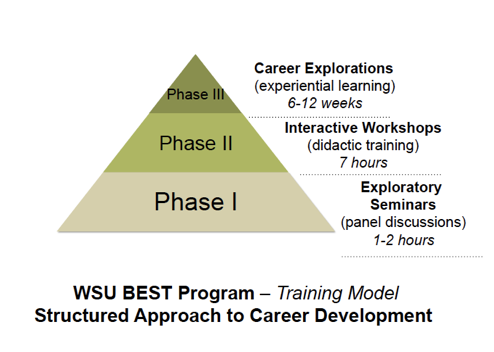WSU-BEST presents at the 2nd Annual Future of Bioscience Graduate and Postdoctoral Training (FOBGAPT2) Meeting in Denver, CO
 Associate Provost and Dean of the Graduate School, Ambika Mathur, Ph.D. was on the Organizing Committee for FOGAPT2, held in early June, a meeting of national stakeholders from across academia, the private sector, foundations, and federal funding agencies to discuss aspects of implementing new training models and develop consensus and recommendations on graduate and postdoctoral training in the biosciences.
Associate Provost and Dean of the Graduate School, Ambika Mathur, Ph.D. was on the Organizing Committee for FOGAPT2, held in early June, a meeting of national stakeholders from across academia, the private sector, foundations, and federal funding agencies to discuss aspects of implementing new training models and develop consensus and recommendations on graduate and postdoctoral training in the biosciences.
Representatives from WSU Graduate School and the Broadening Experiences in Scientific Training (BEST) program participated in workshops and presented outcomes on the benefits of experiential career explorations for students and the responses of faculty to trainee participation in these activities. Workshops included "How to better increase the diversity of scientists in senior and leadership roles," led by Jabbar Bennett, Christine Chow, Ambika Mathur, Nancy Schwartz, and Nancy Street, and "How to increase the engagement of the private sector and other potential employers in training paradigms and opportunities," led by Philip Clifford, Andrew Feig, and Diane Klotz.
Ph.D. student in chemistry Nisansala Muthunayake presented a poster on BEST program design and outcomes. Engineering Ph.D. student Tonya Whitehead was also a participant, and WSU postdoctoral scientist John Anneken received a competitively awarded stipend from FOBGAPT to attend the meeting.
According to Dean Mathur, "The FOBGABT2 meeting was attended by national leaders in the graduate education and policy community. Outcomes from this conference will appear as a white paper that will be presented to biomedical workforce development policymakers, including the National Institutes of Health, and will include a series of recommendations and calls to action to enhance workforce development."